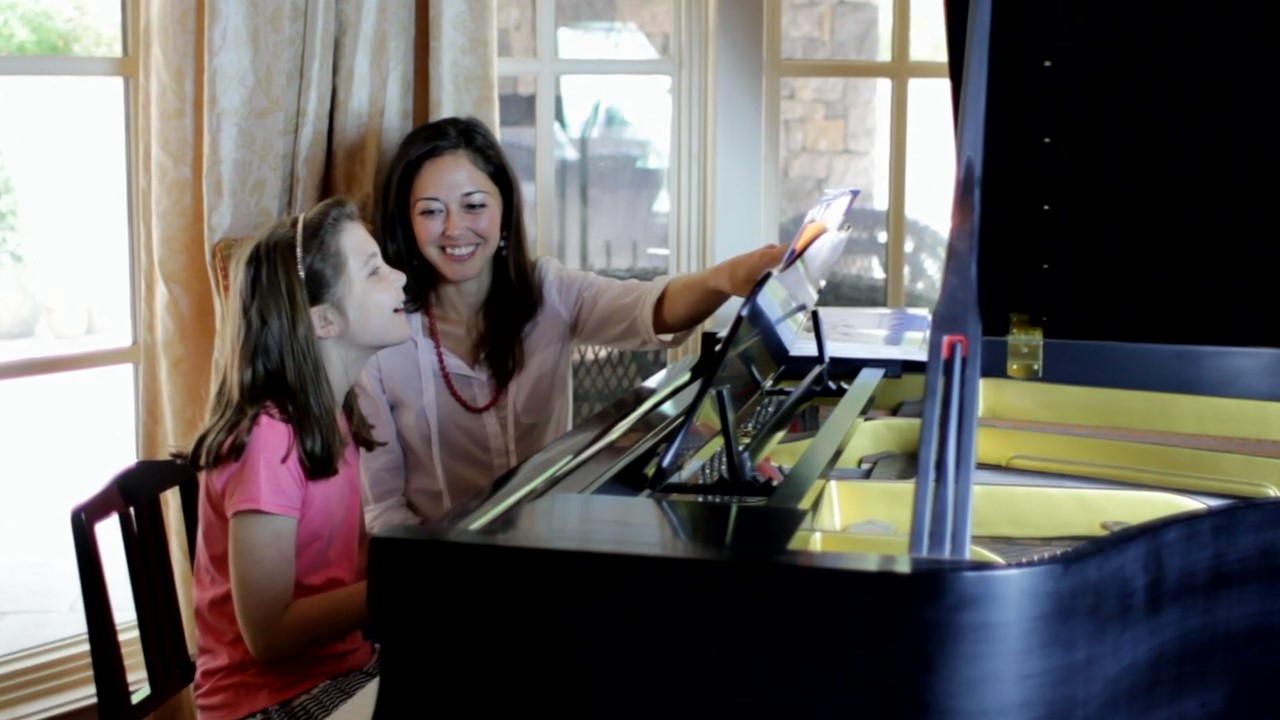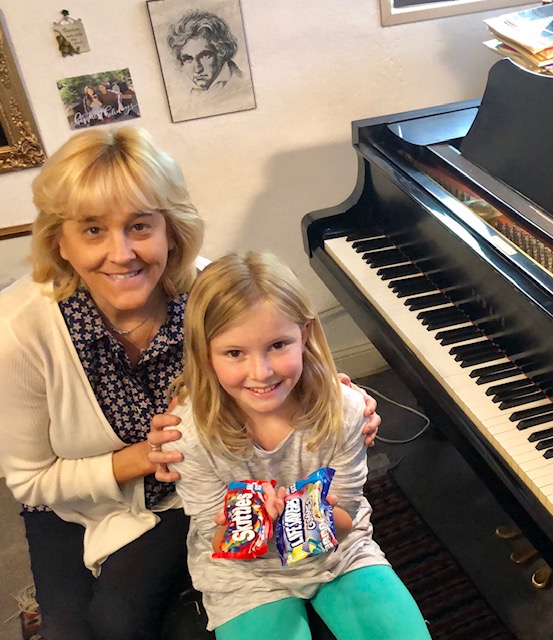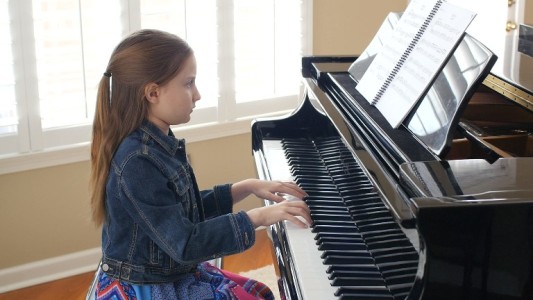Teaching a beginning piano student long term!
So you just signed up a new beginning student. That’s great! But if you’ve been a piano instructor for more than five minutes, you know the most difficult part is keeping a beginning piano student long term!! An intermediate student is rooted, so you don’t have to work to keep them, however there’s challenges for that level as well. It’s often difficult to teach a beginning piano student long term through what I call the “beginner’s hump”, the first 6-9 months of lessons. Since the student has no skill, learning the piano can be frustrating and the opposite of “fun”. There will always be students that will stay no matter what you do because it’s in their DNA to play the piano. Conversely, there are the students who will never learn (or desire to learn) the piano. So let’s leave those two type of students out of this discussion. The majority of students will be in the middle; they’re probably not going to make music a career, but have a love and desire to play the piano. This can apply to both children and adults.
So what are the do’s and don’ts for keeping the majority of the beginning piano students long term? In over 30 years of teaching, I’ve been able to teach most students for a year or more, and some for multiple years. Here’s a list of what I’ve found that help keep the beginner student motivated through the difficult beginning stage.
Be fun and encouraging in the piano lesson

As the piano teacher, you create the environment. If you’re frustrated or bored, the beginning piano student will feel that from you. This can hinder their motivation to learn. I believe a lot of piano teachers make the mistake of teaching ALL students the same, no matter their level. However, a beginner student needs a lighter approach and not the intensity you may have with an intermediate or higher level student. The beginner may be nervous about playing and making mistakes. Being encouraging is very important. They will believe in themselves if they feel YOU believe in them. Let the student know it’s OK to make mistakes, and that it’s part of the learning progress. You may also want to let them know you made mistakes when you were a beginner. This approach can be used for all ages, not just the young student, as the older child/adult needs encouragement the same (maybe more?). And giving the student accolades is not only for their confidence, but also instills playing correctly, as he/she may not even know they played it correctly! This approach is especially important when correcting the student. Keep the critique comment to their mistake only and how to correct it, never a brow beating comment. Most of all, just have fun with the beginner so they enjoy learning and associate piano and music with something that can be enjoyed.
Don’t overwhelm the beginner piano student
Out of all the do’s and don’ts, this is probably the most critical part for the first 1-3 months of lessons. Once a student feels overwhelmed and feeling unable to understand or play what’s asked, the student may want to quit. Usually the student will come up with every excuse for quitting EXCEPT feeling overwhelmed and frustrated. Most students will blame themselves, thinking they’re just not smart enough. As teachers, it’s easy to give way too much information out of our own passion for music. Also it’s easy to forget how difficult even the simplest of playing can be. It’s important to “think” like a beginner when teaching. The very first lesson is the most crucial lesson in setting the standard. I always tell my staff, it’s better to UNDER give than to OVER give on the first lesson. If you have a quick learner, you can always pick up the pace on the following lessons. It’s difficult to impossible to reverse the pace after the first lesson. To make sure your student understands, it’s best to ask him or her questions. I always ask the student way more questions than they ask of me. I never feel like a student understands fully after only explaining a new concept once. I’ll either have them “do” the thing I just explained, or ask questions. Games and drills are a great way to make sure he or she understands fully, and can also be fun for the student.
Be flexible in the direction of the lesson
I’ve often heard teachers writing a lesson plan for private lessons. I’ve NEVER written a lesson plan for a private lesson. The great thing about teaching privately is you can approach each student uniquely. A lesson may go in a different direction than you had expected. It may depend on whether the student understood the previous lesson (and may just need a review), or a question that needs a full lesson to explain. Some students may want to learn something different than what you’re currently teaching. This happens more with the older child or adult. I do want to make it clear that I believe you, the instructor, is ultimately in charge of the direction taken. You should never be talked into teaching anything you feel is not in the best interest of the student. It may be a song beyond their ability, or jumping ahead to a level that will bypass important steps. However, if it’s within their level and ability, I see nothing wrong with diving into it. Or even better, using a part of the lesson. You may have a student that loves to write songs, which I definitely encourage students to do. So why not use the last 5 minutes to let them play their song for you? It could turn into a teaching moment as well as be a lot of fun for the student.
Learn how to “read” the student

This is similar to not overwhelming the student, but goes deeper than making sure the student fully understands. As lessons progress and you get to know your student, it’s important to make sure you’re sensitive to what may be happening in his/her life. There may be times when a student is having trouble at school or home, or with a relationship, etc. Some students will be outspoken about what is going on, while others will be quiet. I always start out my lessons with “How are you doing?” and “How was your week?”. For me, this is not just a way to start the lesson, but a chance to feel how the student is doing emotionally. This may impact how you teach that particular lesson. I’m not advocating asking personal questions or having a therapy session, but if you feel there may be something bothering the student, it can hinder their learning. If it continues, you may need to speak to his/her parent(s), if a child, or for an adult, let them open up to you if they wish. If the student feels they can be somewhat open with you, it helps to create a bond in the lesson and may help in the learning progress. I do want to make it clear, however, it’s important to keep a boundary between you and the student. Although you want your student to feel comfortable, the student is not your child or best friend, so make sure to keep the relationship professional. This can go for you, the instructor as well. If you’re not having a great day, put your poker face on when teaching, and never let your emotions come into play in the lesson.
Different types of learning
Another aspect of “reading” the student is figuring out how he or she learns. Some students learn by verbal explanation, while others learn by watching. Some only learn when actually playing. There are specific methods for the different learning types, so that may help you decide what method to use. That being said, I think it’s a good idea to teach children the opposite of how they learn after the first 9-12 months of lessons. This may help him/her to learn in different capacities since they may need that skill in a job as an adult. There’s also the learning impaired, such as autism, dyslexia, dyscalculia, etc. I once had a student with a disorder where his brain processed faster than his motor movement. I tell most students to read ahead, but with him I had to tell him NOT to read ahead and offered a slightly different approach.
Practicing…the #1 reason to cancel
I’m sure you’ve had many students (or parents of students) cancel for a lack of practicing. I’ve actually never had one of my own students cancel for this reason. That’s because I don’t mention practicing to my beginning students under the age of eight. Wait what? I can hear you all asking….don’t talk about practicing? Yes you heard me right! I’m not saying practicing is not critical for a student to learn, because it definitely is! However, I don’t expect a young beginner to practice for any length of time. The young student hasn’t the discipline or enough knowledge TO practice for more than 5-10 minutes. I simply give easy assignments and tell the parents to have their child “play” it for them. For students over the age of eight, I talk briefly about practicing daily for only 20 or so minutes at a time. This is usually the longest time frame a beginning student can handle, and it doesn’t sound like a daunting task! I give clear assignments for the next week’s lesson so the student knows exactly what to play (notice I didn’t say the “p” word). If the student doesn’t play it to my standard to pass in a lesson, I just re-assign it for the following week until it’s mastered. And when a student tells me they didn’t have much time to practice, I tell them, “That’s ok, let’s shoot for a better week next time”.
Piano lessons are never a waste of time!
The words “You’re wasting MY time and your parent’s money” should NEVER come out of your mouth! I believe learning to play the piano is never a waste of time or money, even if the student seems disinterested. There’re so many good things that come from music lessons that can help in a child’s education, and into their adult life. Also, you never know if at some point the disinterested student may suddenly “click” and love learning to play the piano. However, if after a year or more of lessons they’re still not interested, I would put them in the 2nd category of students I mentioned at the beginning of this blog. In that case, politely tell the parent(s) it’s probably not the student’s desire to learn piano. Never feel like it’s an insult to you if this happens.
Time and be consistent
Once lessons begin, the beginning student may realize learning to play the piano (or any instrument) takes more time than thought. I always laugh at methods that tout learning to play the piano in 3 easy steps or learn 20 songs in 20 days! That’s unrealistic and may set up the piano student for failure. I relate lessons to a marathon, not a sprint. Let the beginning piano student know they’ll learn everything in time. And since it does take time, the lesson itself needs to be consistent. If there are a lot of lessons missed, this will hinder the student’s learning progress. There will always be the student that is committed and attends every week. And conversely, there will be the student that constantly cancels lessons. Since you can’t control the student’s attendance, you CAN control yours. Make sure to schedule lessons at a time you can teach every week. Of course life happens, and there will be lessons missed occasionally, but that should be a rare occurrence. If you have a student that constantly cancels, you may need to change the schedule so he or she can attend every lesson. I have seen a trend that when students miss a lot of lessons, they usually cancel all together.
Policy for student cancellations
Some instructors and studios will allow a student to cancel if they give a 48 hour notice with no charge. Or some will guarantee a make up lesson for some or all student cancellations. While that sounds like you’re being accommodating to the student, that actually tells the student that cancelling lessons is OK. At Melody Music Studios, I charge students if they cancel with no guarantee of a make up lesson. This makes the student accountable in attending all lessons, and in the long run, is better for their learning progress. Also allowing a student to cancel without paying is, in my opinion, unfair to the piano instructor who blocks time in their schedule for each student and depends on each lesson for their income (do I hear a collective amen shout from all piano instructors?).
Use the right book

Using the correct book for each student is important. A lot of method books can be confusing and missing important information. At Melody Music Publishers, there’s a book for sight reading skills as in the “Drill It and Kill It” book, as well as books on playing chords and improvisation, such as the “Chords & Improvisation on the Piano” and “Fake It Til You Make It”. Our unique line of method books are written in a comprehensive and easy to follow way on how students think and learn. Drills, written, and playing assignments are given for students to learn in a deeper level.
Summary
To summarize, it’s important to be encouraging to the beginner and let him or her know you’re on their side! Make sure to keep the lesson in a clear step by step fashion and realistic to the student’s ability. Listen to the student’s interests and be flexible with the direction of the lesson, as well as their emotional state. Don’t stress practicing at the start of the lessons. Keep a consistency in the weekly lesson and schedule them at a good time for you and the student. Use the right book for each student. And finally, when finishing teaching a student, no matter how long a period it may be, end your time with a positive outlook on learning to play the piano. The ultimate goal in teaching piano is helping the student realize he/she can enjoy playing the piano for a lifetime!

Kathi Kerr is owner and founder of Melody Music Studios, where she hires music and voice instructors across the county. She also is owner and author of Melody Music Publishers, which is a line of piano method books. Check out her books here.
To all piano instructors: we would love your comments and opinions, so feel free to leave your comment below! This is a forum FROM piano teachers FOR piano teachers! Thank you for your dedication to teaching piano and music to others!
Teaching a beginning piano student long term! Read More »

